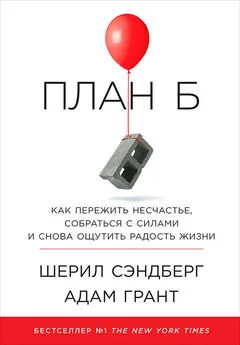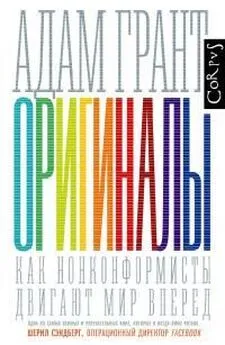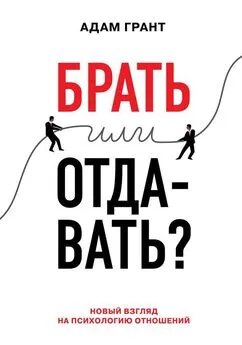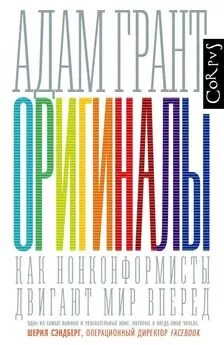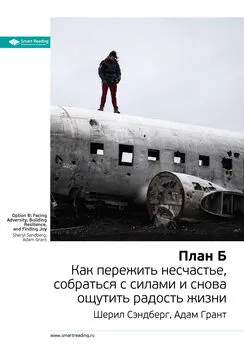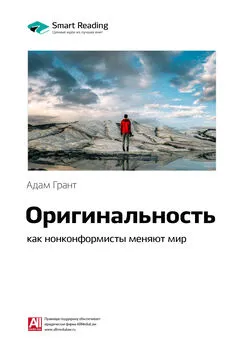Адам Грант - Подумайте еще раз. Сила знания о незнании
- Название:Подумайте еще раз. Сила знания о незнании
- Автор:
- Жанр:
- Издательство:Манн, Иванов и Фербер
- Год:2021
- Город:Москва
- ISBN:9785001698531
- Рейтинг:
- Избранное:Добавить в избранное
-
Отзывы:
-
Ваша оценка:
Адам Грант - Подумайте еще раз. Сила знания о незнании краткое содержание
Для всех, кто хочет научиться критически оценивать реальность и свои решения, переосмысливать и переучиваться, двигаясь вперед.
Подумайте еще раз. Сила знания о незнании - читать онлайн бесплатно ознакомительный отрывок
Интервал:
Закладка:
Все книги по бизнесу и маркетингу на одной странице: mif.to/business
mif.to/marketing
Узнавай первым о новых книгах, скидках и подарках из нашей рассылки mif.to/b-letter
#mifbooks 
#mifbooks 
#mifbooks 
#mifbooks 
Над книгой работали

Руководитель редакционной группы Светлана Мотылькова
Ответственный редактор Наталья Довнар
Литературный редактор Ольга Дергачева
Арт-директор Алексей Богомолов
Дизайн обложки Наталия Майкова
Корректоры Анна Матвеева, Анна Пенская
ООО «Манн, Иванов и Фербер»
mann-ivanov-ferber.ru
Электронная версия книги подготовлена компанией Webkniga.ru, 2021
Примечания
1
Frank L. Schmidt and John Hunter, «General Mental Ability in the World of Work: Occupational Attainment and Job Performance», Journal of Personality and Social Psychology 86 (2004): 162–173.
2
David C. Geary, «Efficiency of Mitochondrial Functioning as the Fundamental Biological Mechanism of General Intelligence (G)», Psychological Review 15 (2018): 1028–1050.
3
Neel Burton, «What Is Intelligence?», Psychology Today, November 28, 2018, www.psychologytoday.com/us/blog/hide-and-seek/201811/what-is-intelligence; Charles Stangor and Jennifer Walinga, Introduction to Psychology (Victoria, BC: BCcampus, 2014); Frank L. Schmidt, «The Role of Cognitive Ability and Job Performance: Why There Cannot Be a Debate», Human Performance 15 (2002): 187–210.
4
A Systematic Approach to the GRE (New York: Kaplan, 1999).
5
Ludy T. Benjamin Jr., Timothy A. Cavell, and William R. Shallenberger III, «Staying with Initial Answers on Objective Tests: Is It a Myth?», Teaching of Psychology 11 (1984): 133–141.
6
Justin Kruger, Derrick Wirtz, and Dale T. Miller, «Counterfactual Thinking and the First Instinct Fallacy», Journal of Personality and Social Psychology 88 (2005): 725–735.
7
Yongnam Kim, «Apples to Oranges: Causal Effects of Answer Changing in Multiple-Choice Exams», arXiv:1808.10577v4, last revised October 14, 2019, arxiv.org/abs/1808.10577.
8
Justin J. Couchman et al., «The Instinct Fallacy: The Metacognition of Answering and Revising during College Exams», Metacognition and Learning 11 (2016): 171–185.
9
Charles M. Slem, «The Effects of an Educational Intervention on Answer Changing Behavior», Annual Convention of the American Psychological Association, August 1985, eric.ed.gov/?id=ED266395.
10
Susan T. Fiske and Shelley E. Taylor, Social Cognition: From Brains to Culture, 2nd ed. (Los Angeles: Sage, 2013).
11
Arie W. Kruglanski and Donna M. Webster, «Motivated Closing of the Mind: ‘Seizing’ and ‘Freezing’», Psychological Review 103 (1996): 263–283.
12
James Fallows, «The Boiled-Frog Myth: Stop the Lying Now!», The Atlantic, September 16, 2006, www.theatlantic.com/technology/archive/2006/09/the-boiled-frog-myth-stop-the-lying-now/7446/.
13
Norman Maclean, Young Men and Fire, 25th anniversary ed. (Chicago: University of Chicago Press, 2017); см. также www.nifc.gov/safety/mann_gulch/event_timeline/event6.htm.
14
Barry M. Staw, Lance E. Sandelands, and Jane E. Dutton, «Threat Rigidity Effects in Organizational Behavior: A Multilevel Analysis», Administrative Science Quarterly 26 (1981): 501–524; Karl E. Weick, «The Collapse of SenseMaking in Organizations: The Mann Gulch Disaster», Administrative Science Quarterly 38 (1993): 628–52.
15
Ted Putnam, «Findings from the Wildland Firefighters Human Factors Workshop», United States Department of Agriculture, Forest Service, Technology & Development Program, November 1995.
16
John N. Maclean, Fire on the Mountain: The True Story of the South Canyon Fire (New York: HarperPerennial, 2009).
17
Ted Putnam, «Analysis of Escape Efforts and Personal Protective Equipment on the South Canyon Fire», Wildfire 4 (1995): 34–39.
18
Ted Putnam, «The Collapse of Decision Making and Organizational Structure on Storm King Mountain», Wildfire 4 (1995): 40–45.
19
Report of the South Canyon Fire Accident Investigation Team, August 17, 1994.
20
Karl E. Weick, «Drop Your Tools: An Allegory for Organizational Studies», Administrative Science Quarterly 41 (1996): 301–13.
21
Elizabeth Widdicombe, «Prefrosh E-group Connected Class of ’03», Harvard Crimson, June 5, 2003, www.thecrimson.com/article/2003/6/5/prefrosh-e-group-connected-class-of-03; Scott A. Golder, «Re: ‘Alone in Annenberg? First-Years Take Heart’», Harvard Crimson, September 17, 1999, www.thecrimson.com/article/1999/9/17/letters-begroup-an-important-link-connecting.
22
Black Lives Matter: Nate Cohn and Kevin Quealy, «How Public Opinion Has Moved on Black Lives Matter», New York Times, June 10, 2020, www.nytimes.com/interactive/2020/06/10/upshot/black-lives-matter-attitudes.html.
23
Kathryn Schulz, «The Story That Tore Through the Trees», New York Magazine, September 9, 2014, nymag.com/arts/books/features/mann-gulch-norman-maclean-2014-9/index.html.
24
George Bernard Shaw, Everybody’s Political What’s What? (London: Constable, 1944).
25
Jacquie McNish and Sean Silcoff, Losing the Signal: The Untold Story behind the Extraordinary Rise and Spectacular Fall of BlackBerry (New York: Flatiron Books, 2015).
26
«100 Fastest-Growing Companies», CNN Money, August 31, 2009, money.cnn.com/magazines/fortune/fortunefastestgrowing/2009/snapshots/1.html.
27
Richard Alleyne, «Welcome to the Information Age—174 Newspapers a Day», Daily Telegraph, February 11, 2011, www.telegraph.co.uk/news/science/science-news/8316534/Welcome-to-the-information-age-174-newspapers-a-day.html.
28
Peter Densen, «Challenges and Opportunities Facing Medical Education», Transactions of the American Clinical and Climatological Association 122 (2011): 48–58.
29
Joshua J. Clarkson, Zakary L. Tormala, and Christopher Leone, «A Self-Validation Perspective on the Mere Thought Effect», Journal of Experimental Social Psychology 47 (2011): 449–54.
30
Jamie Barden and Richard E. Petty, «The Mere Perception of Elaboration Creates Attitude Certainty: Exploring the Thoughtfulness Heuristic», Journal of Personality and Social Psychology 95 (2008): 489–509.
31
W. Ralph Eubanks, «How History and Hollywood Got ‘Cleopatra’ Wrong», NPR, November 1, 2010, www.npr.org/templates/story/story.php?storyId=130976125.
32
Jason Farago, «T. Rex Like You Haven’t Seen Him: With Feathers», New York Times, March 7, 2019, www.nytimes.com/2019/03/07/arts/design/t-rex-exhibition-american-museum-of-natural-history.html; Brigit Katz, «T. Rex Was Likely Covered in Scales, Not Feathers», Smithsonian, June 8, 2017, www.smithsonianmag.com/smart-news/t-rex-skin-was-not-covered-feathers-study-says-180963603.
33
Alix Spiegel and Lulu Miller, «How to Become Batman», Invisibilia, NPR, January 23, 2015, www.npr.org/programs/invisibilia/378577902/how-to-become-batman.
34
Добавлю от себя, что всегда думал, что выражение «поддуть дыма в задницу» [ Sterling Haynes, «Special Feature: Tobacco Smoke Enemas», BC Medical Journal 54 (2012): 496–97. ] пошло от традиции дарить сигары, чтобы произвести хорошее впечатление. Можете представить мое изумление, когда жена рассказала мне об истинном происхождении этого оборота: в 1700-х утонувших пытались возвращать к жизни, в прямом смысле вдувая им дым в задний проход посредством клизмы. Что это вредно для сердца, стало известно позже.
35
Stephen Greenspan, «Why We Keep Falling for Financial Scams», Wall Street Journal, January 3, 2009, www.wsj.com/articles/SB123093987596650197.
36
Philip E. Tetlock, «Social Functionalist Frameworks for Judgment and Choice: Intuitive Politicians, Theologians, and Prosecutors», Psychological Review 109 (2002): 451–71.
37
Hugo Mercier and Dan Sperber, «Why Do Humans Reason? Arguments from an Argumentative Theory», Behavioral and Brain Sciences 34 (2011): 57–74.
38
Stephen Greenspan, «Fooled by Ponzi (and Madoff): How Bernard Madoff Made Off with My Money», eSkeptic, December 23, 2008, www.skeptic.com/eskeptic/08-12-23/#feature.
39
Greg Griffin, «Scam Expert from CU Expertly Scammed», Denver Post, March 2, 2009, www.denverpost.com/2009/03/02/scam-expert-from-cu-expertly-scammed.
40
George A. Kelly, The Psychology of Personal Constructs, vol. 1, A Theory of Personality (New York: Norton, 1955); Brian R. Little, Who Are You, Really? The Surprising Puzzle of Personality (New York: Simon & Schuster, 2017).
41
Arnaldo Camuffo et al., «A Scientific Approach to Entrepreneurial Decision Making: Evidence from a Randomized Control Trial», Management Science 66 (2020): 564–86.
42
Mark Chussil, «Slow Deciders Make Better Strategists», Harvard Business Review, July 8, 2016, hbr.org/2016/07/slow-deciders-make-better-strategists.
43
Walter Isaacson, Einstein: His Life and Universe (New York: Simon & Schuster, 2007).
Читать дальшеИнтервал:
Закладка:

